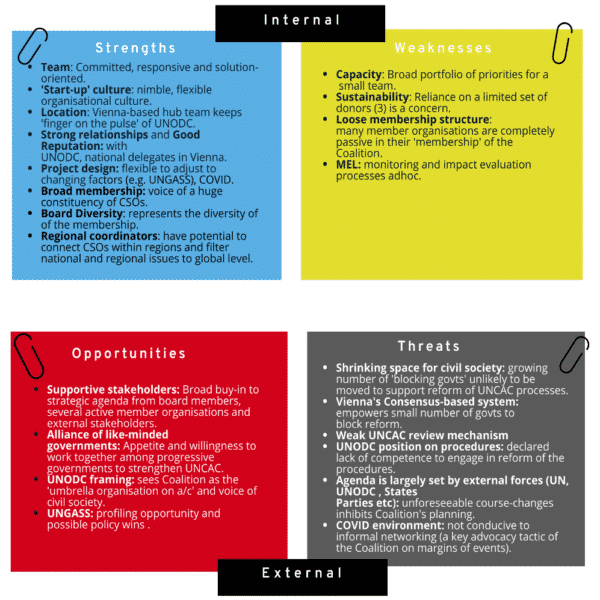6 April 2021 –
The UNCAC Coalition is glad to publish the full findings of an independent review of the progress made in the implementation of its Programme “Civil Society Participation in the UNCAC – Building Momentum for Change” funded by the Norwegian Agency for Development Cooperation (Norad). The review was undertaken by Dr. Suzanne Mulcahy and Coralie Pring.
The Programme sought to increase the involvement of CSOs in UNCAC processes and fora, including by supporting civil society participation in the Second Cycle of the review of UNCAC implementation. The activities undertaken by the Coalition during the programme implementation period between November 2018 and December 2020 sought to bring about change at the national, international and intergovernmental levels.
The evaluation assessed the programme according to its relevance, effectiveness, efficiency, impact and sustainability, as well as reviewing the ‘programme design and management’ and the ‘added value’ of the Programme on CSO participation in the UNCAC. The development of the UNCAC Coalition as an organisation was also reviewed through the evaluation.

Key Findings
Among the key findings of the evaluation are:
– Relevance: The work of the Coalition is perceived as relevant. The Coalition has displayed an appropriate level of flexibility to changing circumstances and exhibits a high level of awareness of both the UNODC ‘universe’, its parameters and limitations, as well as the diverse national environments in which the member organisations are working.
– Effectiveness: Most programme outputs were achieved and activities were implemented to a very high standard. The Programme had more limited success in achieving substantial gains towards the higher-order outcomes and impacts, but some developments towards achievement were observed.
– Efficiency: The programme was efficiently delivered. Both internal and external factors posed significant challenges to the achievement of planned results, but ‘the Vienna Hub’ demonstrated responsiveness and flexibility, which led to significant progress, particularly in the latter half of the Programme.
– Impact: The review found several promising stories of impact, despite the short programme timeline, which represent successes or potential successes for the Coalition. The four most significant impacts identified were:
- Providing support to CSOs engaging with their national governments on the Second Cycle UNCAC Review via the Transparency Pledge,
- Enabling a more transparent and inclusive UNCAC Review process via CSO Parallel Reports,
- Strong international advocacy via engagement with government delegates in Vienna,
- The organisational evolution and professionalisation of the Coalition.
– Sustainability: Many aspects of the programme show a high likelihood of enduring beyond its lifetime, including the capacity-building efforts, the professionalisation of the Vienna Hub, the research and knowledge products produced, and the networking relationships built up at the national and international level.
– Programme Design and Management: The programme enabled the professionalisation of the Coalition’s Hub in Vienna, with a larger, committed, and well-qualified team now in place and operating smoothly.
– Added value: The Coalition added considerable value to the participation of CSOs around the UNCAC. The interventions, at both the national and international level, benefited substantially from being implemented by the UNCAC Coalition.
Strategic recommendations for the Coalition based on the review findings include:
– Strengthening the organisation’s Theory of Change.
– Reviewing the advocacy strategy with regards to CSO participation in the subsidiary bodies of the CoSP.
– Developing an internal and external stakeholder engagement strategy to increase engagement and maintain momentum.
– Developing a fundraising strategy to diversify the funding base and provide seed funding for members’ activities.
Operational recommendations include: updating internal policies including a Monitoring, Evaluation and Learning (MEL) system, extending partnerships to other UN and regional bodies, reviewing engagement tactics with country delegations, and continuing external communications, including on social media.
The Coalition wishes to thank all internal and external stakeholders who contributed to the success of this evaluation: representatives of member and affiliated CSOs, CCC board members, colleagues from the UNCAC secretariat and UNODC’s Civil Society Team, country delegates and representatives of the donor partners. We especially thank evaluators Dr. Suzanne Mulcahy and Coralie Pring for their dedication and thoroughness in performing this review.



